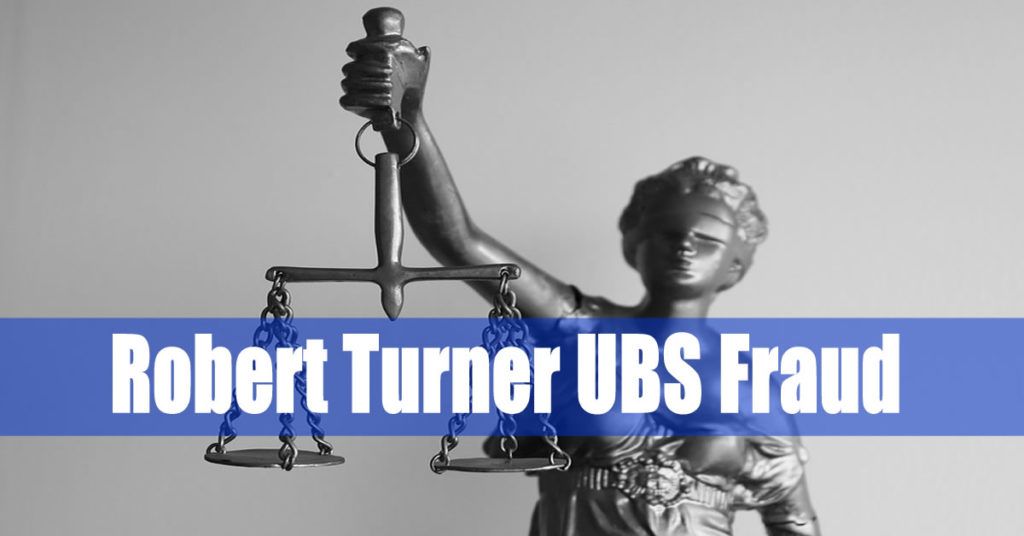Robert Turner, a former UBS financial advisor, based in Texas is being pursued by his one-time employer UBS for misappropriation of funds and causing losses exceeding $17 million in the accounts of 23 customers of the firm. The period of the alleged wrongdoing is a fairly stretched-out period lasting 24 years according to KWTX, based on information available from the recently-filed lawsuit in Waco’s 414th State District Court.
According to the suit, the FA sought money into purported investments that promised a return of between 4 and 8%, compounded quarterly. According to the TV station, UBS has classified it as “a scheme that Robert Turner and his college buddy, Mark Woodward, cooked up.”
KWTX has also reported that soon after being confronted by the Federal Bureau of Investigations (FBI) over his role in the scheme, Woodward, 68, committed suicide. This was on the 20th of December, 2021.
As part of its efforts to compensate customers losing money in the scheme, UBS has sought control over its assets of Turner. The TV station has also advised that 3 customers have been reimbursed $5.8 million by UBS, as per statements made by them in the suit. Stephanie Turner, the wife of Robert Turner, has also been named as a defendant in the suit, without being named as a wrongdoer. The objective is to attach the community property of the Turners.
Are you a victim of investment fraud by Robert Turner? Contact Haselkorn & Thibaut, P.A. at 1-800-856-3352 for a free private consultation.
Turner has been questioned by the FBI. He has declined to speak to KWTX.
BrokerCheck record of Robert Turner
Table of Contents
According to his BrokerCheck record, Turner started his career in the financial services industry in 1991 when he joined Merrill Lynch. In 1996 he moved to UBS for a long career that lasted till 2021 when he left UBS and joined Stifel, Nicklaus & Co.
Citing “[c]oncerns related to FAs acknowledgment of involvement with investments not offered at his prior firm while employed at the prior firm,” earlier this year he was allowed to resign voluntarily by Stifel, Nicklaus & Co.
Turner does not appear to have registered with any firm after leaving Stifel, Nicklaus & Co. The Investment Advisor Public Disclosure database of the Securities and Exchange Commission (SEC) also bears this out.
A customer dispute on his profile, related to variable annuities, dating to October 2020, is showing as settled for $150K. Three recent cases, filed this year, that allege selling away, fraud, and stealing money from a customer’s account, are still pending. Collectively, these three cases seek $750K in damages.
How to Spot Financial Advisor Fraud
One warning sign of financial advisor fraud is the receipt of unsolicited investment offers. This could take the form of phone calls or emails that promise big returns. Unfortunately, these offers are scams designed to rob people of their hard-earned money. They usually promise guaranteed returns that don’t actually exist, so run as fast as you can! In the event that you suspect that a financial advisor is engaging in financial fraud, you should contact the appropriate authorities.
Financial advisors who have more than 100 clients may be operating on commission and motivated to sell based on the commission. Likewise, advisors who appear older may have limited experience. In many cases, financial advisor scammers use front men who appear more experienced. The only way to spot a fraudster is to do some homework before you sign on the dotted line. A good way to avoid falling victim to financial advisor fraud is to avoid putting your faith in anyone who says they are a professional.
Financial advisors who promise returns higher than the market average are likely scams. They may offer high returns, but you will be paying high-interest rates to earn a high commission. Moreover, a genuine adviser won’t be cold-calling you. In addition, financial advisors should disclose their fees upfront. The “too good to be true” axiom is usually accurate. A bogus adviser may even be copying genuine material to appear legitimate. A senior police officer in England fell prey to a fraudulent adviser online after being charged an exorbitant fee.
A financial adviser should not hold a power of attorney or have the power to make trades for you. They should also require their clients to receive statements from their custodians. These statements should be sent to you separately from their personal bank accounts. When selecting an adviser, ask for names of satisfied long-term clients. These references could be prescreened or even friends of the advisor. You may also consider asking a prospective financial advisor for referrals.
There is a high risk of financial advisor fraud. In fact, almost half of households utilize the services of a financial advisor. Yet, only 7 percent of financial advisers have been disciplined due to misconduct, which could include negligence, placing the client in unsuitable investments, or trading on the client’s account without permission. The third type of financial advisor fraud is known as affinity fraud. This type of fraud targets groups and convinces them to participate in the scam.
Some financial advisor scams involve misrepresenting the qualifications of their firm. They also promise unrealistic returns, which in turn cost their customers money. These scams are also called “churning” scams. They involve advisors making a lot of trades that do not produce the expected returns. The scam usually ends in failure when the new money is not enough to pay off the old investors. The victim has been ripped off out of their hard-earned money.
Are you a victim of investment fraud by Robert Turner? Contact Haselkorn & Thibaut, P.A. at 1-800-856-3352 for a free private consultation.


